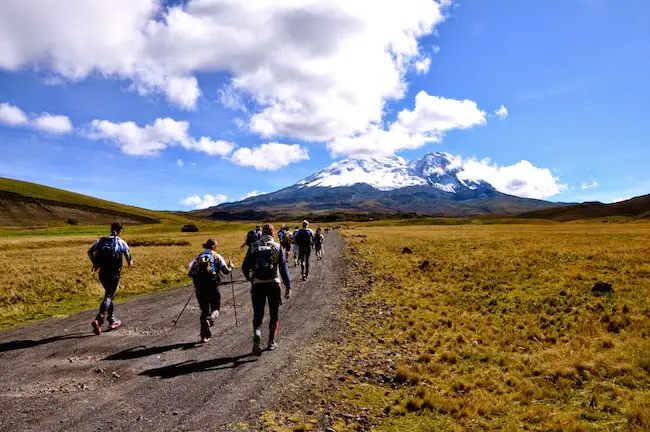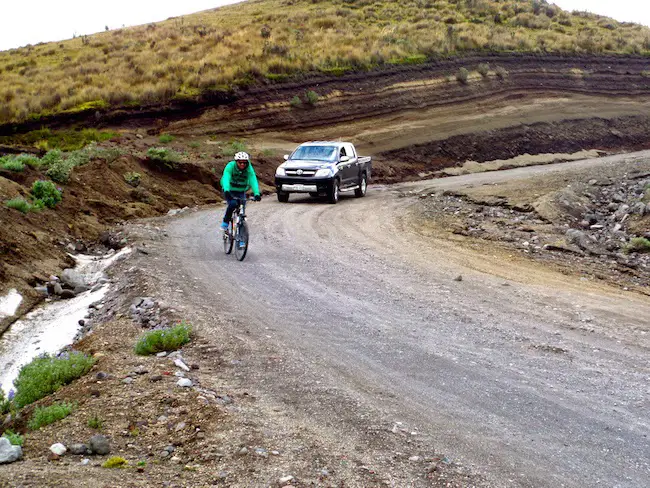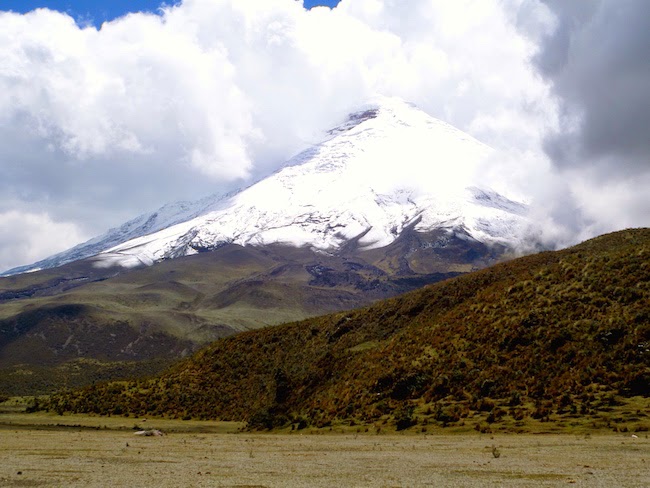In case it wasn’t entirely clear in my first two posts from Quito, I’ve very much been enjoying my stay in Ecuador so far. The city is rich in culture and history, with interesting things to discover around just about every turn. But that said, I’m here for some outdoor adventure, and now that I’ve had a few days to acclimatize, I’ve been eager to get my fix. Fortunately, today was the day that would.
Between arriving late in the evening on my first night in Quito, and getting food poisoning on my second, I really haven’t had the opportunity to get a good night’s sleep just yet. That didn’t change last night, because while I did manage to sleep like a log, the alarm went off at 3:30 AM to remind me that there was a major adventure race starting today. The teams weren’t scheduled to set out until 8:30 AM, but it was quite a drive out to the starting point, and all the media covering the race had to be there early to stake out a good vantage point.
It turns out, it was completely worth getting up before the crack of dawn to drive out to Antisana National Park, where the Huairasinchi Explorer was scheduled to begin. Once we left the metropolitan sprawl of Quito behind, things started to get truly interesting. The rural Ecuadorian landscapes are beautiful of course, but nothing prepared me for what we’d find in the park itself. Not only did the national park’s namesake volcano loom large over the starting line, a variety of other impressive volcanic mountaintops showed their faces as well, including Cotopaxi, the second tallest mountain in Ecuador.
I’d get a much better look at Cotopaxi later in the day, but this morning it was all about the start of the Adventure Racing World Championship. The teams began arriving in Antisana about an hour ahead of the 8:30 AM start. Most were anxious to get the event started, and fortunately for them the race directors were eager to oblige. The starting gun went off right on scheduled, the teams set off on food for the first leg, a trekking excursion across one of Ecuador’s most pristine ecological preserves.

As the racers departed for what promises to be an epic adventure, it didn’t take long for the teams to begin to separate themselves from one another. No more than a kilometer or two in, the pack split into two distinct groups, with many teams sticking to the main road for as far as they could benefit from it, while others struck out over open country, choosing to navigate more directly towards their first checkpoint. In the long run, these first few moments of the race probably won’t decide the winner, but it was interesting to see the strategies begin to play out even so close to the starting line.
The ARWC will now continue for eight days, officially coming to a close next Sunday. The teams face a course that is 710 km (440 miles) in length, and will test them both physically and mentally. They’ll trek, mountain bike, paddle, and navigate through some of Ecuador’s most spectacular landscapes, going from the highlands to the Pacific Coast, with a visit to the Amazon as well.
The top team is expected to cross the finish line in as few as 5 days. That team is still a very long way from the point however, but there are some outstanding teams already lurking near the top of the leaderboard. They include Team Seagate from New Zealand, Haglöffs Silva from Sweden, and adidas Terrex from the U.K. There is still a lot of racing to be done of course, and it should be an amazing event to watch unfold.
With the AR World Championship now underway, I will turn my attention to other activities in Ecuador in the days to come. That started today, with a visit to Cotopaxi National Park for a little mountain biking. When I saw that I’d be riding down the slopes of the volcano on my itinerary, I wasn’t sure what to expect. Turn out, it was fun, white-knuckle thrill ride that tops any amusement park attraction in terms of speed and adrenaline.

In order to ride down the mountain, you must of course first drive up it. Access to the park is gained along a nice, two lane highway that takes visitors through the entrance, and a short distance onto the government protected lands. That nicely paved highway soon gives way to a rough, gravel road that shows the wear and tear of countless automobiles passing along its route. The road narrows as you climb up to the starting point of the ride, which is a visitors parking lot situated at about 4500 meters (14,763 ft). While I was unloading and setting up my bike, others were proceeding up the mountain along a variety of trails. I envied them to a degree, but i wasn’t there to climb that day, but instead ride back down the vary road that brought me up.
Experienced mountain bikers will find no technical sections on this ride at all – that is if you don’t count the numerous potholes and ruts carved out by passing tires, and the runoff of rain. For them, this will be a fast and furious descent, that is all about the adrenaline rush. Less experienced riders will probably find themselves hanging on for dear life, as they inch their way down the road, which is trying desperately to shake them off their bikes. Make no mistake, this is a fun experience that anyone can do, it’ll just be a lot scarier for travelers who haven’t mountain biked before.
Once you approach the bottom of the trail, the road smooths out to a degree, allowing riders to go even faster. The descent is quite fun, and will give you plenty of speed, and while many riders stop at the bottom of the big slope, it is possible to ride your bike all the way back to the entrance. In my case, a sudden rainstorm brought an end to my afternoon ride, although I did really enjoy the entire experience.
If you’d like to ride Cotopaxi yourself, there are two things to keep in mind. First, make sure that the lockout system on your front suspension is not turned on. Halfway through my ride, I realized I hadn’t checked it, so when I stopped for photos, I made sure it was off. That made for a much smoother ride to the bottom, as the suspension took the brunt of many of the bumps for me.

The other thing to be mindful of his your level of acclimatization. For the most part, you never have to pedal on the ride down the slopes of the volcano, but if you continue on, you may have some uphill to contend with. After three days in Ecuador, I was feeling pretty good, but once I had my first major climb, my lungs and heart were screaming for relief. I’m use to dealing with hills both on my road and mountain bike, so it took me a second to realize that my body was still getting use to the altitude. I was trying to climb a decently sized hill, slick with mud and rain, at an altitude of about. 3350 meters (11,000 ft), and my body just wan’t quite ready for it. It was rather humbling to say the least.
With my mountain biking adventure behind me, it was time to check in to my hotel for the evening. Tonight I’m staying at an incredibly charming hosteria called Papagayo. If you’re planning a visit to Ecuador, you need to put this place on your list of accommodations for where you should stay. The staff are incredibly welcoming, even compared to the impossibly high standards that the Quito, and the rest of the country, have set. The food is delicious as well, and the atmosphere is quiet, and inviting. Located a short distance outside of Quito, the place is a complete gem, and a nice respite from the hustle and bustle of Ecuador’s capital.
Tomorrow, I’m off to visit a Quechua village, and do some hiking. Hopefully the weather continues to be amazing, as despite a few late afternoon rainstorms, the conditions have been perfect so far.
More on my Ecuadorian adventures soon!
- Gear Review: The Xero Scrambler Mid is an Ultralight Hiking Shoe for Spring - March 1, 2023
- Gear Review: Yeti Roadie 48 Wheeled Cooler - August 18, 2022
- Kristin Harila Continues Pursuit of 8000-Meter Speed Record - August 16, 2022
